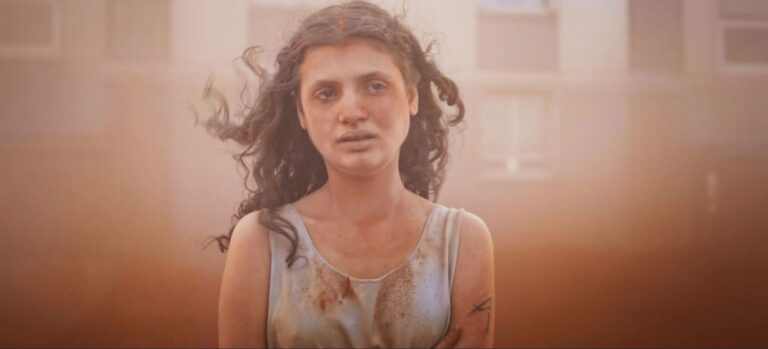Once again, French director Julia Ducournau takes us into the lower depths. Four years after winning the Palme d’Or with her extraordinary Titane – in which humans and cars fused with grinding, crunching erotic energy – she returns to the Cannes Film Festival competition with Alpha, a film just as likely as Titane to divide audiences between the dazzled and disgusted.
Once again, Ducournau sets herself on a collision course with the human body, its hungers, wounds and weaknesses. A heroin addict writhes in agonies of withdrawal; a tattoo keeps gushing blood; most significantly, a virus is circulating that gradually turns people into brittle statues, the parts that have become ceramic crumbling into shards while bodily fluids seep out of the cracks that still hold.
In color so desaturated that the world appears in shades of blue-black, Ducournau takes us to an underworld of clubs filled with multiply pierced human wrecks, living it up while waiting to die. It is the kind of apocalyptic spectacle we might expect from her. What is more confronting is that the central character is a girl of 13 who has just been forcibly tattooed by a classmate with a dirty hypodermic. As the eponymous Alpha says to her mother as she sits next to her prostrate uncle, charged by him with letting him finally die of an overdose, she is too young to deal with this. I sometimes felt a bit young for it myself.
RELATED: Cannes Film Festival Photos Day 7: Spike Lee, Denzel Washington, Dakota Johnson ‘Highest 2 Lowest,’ ‘Splitsville’ & Alpha Premieres
The framework of Alpha owes less to genre, however, than it does to family drama. Alpha (Mélissa Boros) is the only child of a young woman doctor (Golshifteh Farahani) working in a closed hospital ward with sufferers of the virus, with many more of the sick gathered outside her hospital, beating on the doors. Alpha is also a handful, her waywardness sometimes childish – climbing out of her window on to the rickety scaffolding that cloaks their building, for example – and sometimes the kind of adolescent madness that leads to sex, drugs and viruses. Convinced her daughter is now infected, Mother keeps testing her. Farahani, always impressive, is a force of nature here. Boros’ Alpha, given to drifting into reveries like so many teenage girls, is immediately recognizable; we fear for her.
Mother has reason to worry about Alpha. Her brother Amin (Tahar Rahim) is an abject junkie, his arms covered in the sloppy holes made by repeat use. Rahim, with strikingly little dialogue, gives the physical performance of a lifetime, his ravaged body as expressive as a dancer’s. Mother is letting him stay, sleeping on Alpha’s bedroom floor, because – as she says – she won’t give up on him. She must look after everyone; everyone needs her, even if they don’t want her. “Too much love,” Amin observes to his niece, “makes you crazy.” Although perhaps not as crazy as their Berber grandmother, who puts both his addiction and the virus down to the Red Wind, a kind of demonic possession.
Grandma may have a point. Clouds of red dust swirl through the film repeatedly, a roaring wind surging on the soundtrack. Blasts of wind, rolling surf, fissuring earth: these elemental threats appear and disappear like signs from the heavens, harbingers of the end times. Music pounds through the film, each song going over the top of the soundscape’s trenches like an army going into battle. In the opening scene we see 5-year-old Alpha with a felt pen, joining the dots on her uncle’s arm. “That looks prettier,” she says, as Beth Gibbons’ soaring soprano on Portishead’s “Roads” seems about to lift the movie into orbit.
At home, Alpha has Uncle Amin jack-knifing with cramps on her floor, then slipping out of the family’s Eid dinner to score. At school, word is out about her potential infection. Ducournau is at her uncompromising best when dealing with the bullies, fears and betrayals of her friends; a scene in which a classmate tries to drown her in the school pool, shot largely at water level, is a tour de force. She fights back, partly out of ignorance; she thinks she can’t infect her sometime boyfriend Adrien (Louai El Amrousy) because they already know each other. All the wrong-headed guesses and paranoia that surrounded AIDS in the ‘80s, revived from their temporary lull by the recent pandemic, are thrown into relief by microcosm of high school. Mother is aghast when the head teacher expels Alpha. Alpha herself just wants to get out before the kids kill her.
Less overwhelming than Titane, Alpha may have a tighter grip on the real world. Its muddle of timescales, which mean that Alpha can be 5 and then 11 in the same scene, or in two scenes that mirror each other, or that seem to follow on from each other but may also be separated by years, is frustrating: the crises in Alpha’s short life may arrive cyclically, like the coming of a desert wind, but these repetitions smack of confusion for its own sake. The film’s sheer, unrelenting squalor can wear you down, too. Those three performances, on the other hand, are indelible triumphs. Along with the power of Ducournau’s cinematic vision, of course, which carries all the ordure in the world before it.
Title: Alpha
Festival: Cannes (Competition)
Distributor: Neon
Director-screenwriter: Julia Ducournau
Cast: Tahar Rahim, Golshifteh Farahani, Mélissa Boros, Emma Mackey, Finnegan Oldfield, Louai El Amrousy
Running time: 2 hr 8 mins


